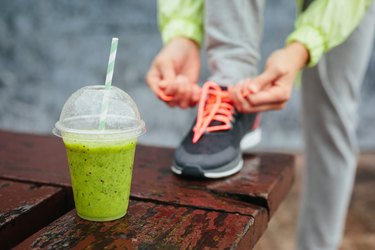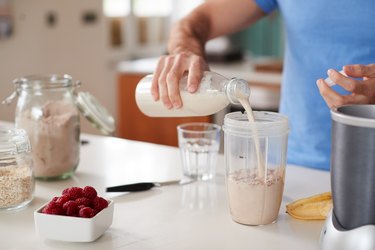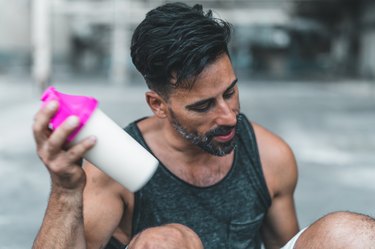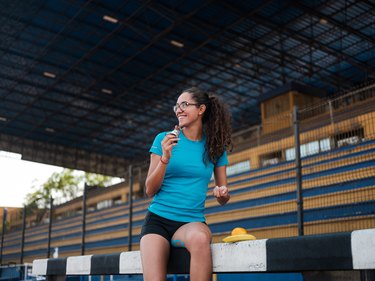
Want to gain muscle and get lean or build your stamina to push past that finish line? Fueling yourself with the right macronutrients at the right times can help you crush your fitness — and life — goals, whether you exercise on a daily basis or consider yourself a weekend warrior.
Optimizing your nutrition for fitness may seem complicated (and sometimes it is), but learning the basics is surprisingly simple and worth your time. What you eat and when you eat it can make an unbelievable difference in all aspects of your physical performance.
But the best place to start actually has nothing to do with macronutrients. Yep, we're talking about water. Staying hydrated is key to, well, just about everything, and it can help you avoid the kind of muscle soreness that reminds you of your last workout every time you walk down the stairs or get up off the couch. So keep water close at hand throughout the day and you'll have already checked item No. 1 off the sports nutrition to-do list.
As for the rest of the list: Regardless of your fitness level or ultimate goal, this guide will teach you how to fill your plate with the right macros today so that you'll be able to hit the ground running again tomorrow.
Get a Head Start With the Right Pre-Workout Foods

You wouldn't embark on a road trip with an empty tank, and the same goes for fueling up before exercise: Eating a small meal or snack before hitting the weights or starting line can affect both the quality of your workout as well as your recovery. But grabbing just any snack won't do — you have to be strategic about it.
"Your pre-workout meal or snack should contain at least 75 percent of total calories coming from carbs and no more than 25 percent coming from protein," says Jim White, RD, and personal trainer. Carbohydrates — which are stored as glycogen in your muscles and liver — are your body's primary source of energy and are especially important for short, intense bouts of activity, such as sprinting or weightlifting, while protein helps support muscle repair. If you're running a marathon, you'll also want to add some fats, which provide the main energy source for long-duration, low- to moderate-intensity exercise.
Find out how to choose the best pre-workout foods.
Refueling After the Gym

Once you've stretched and foam-rolled, it's time to sit down to a meal or grab a snack... Yes, even if you're trying to lose weight! Although it seems counterintuitive, eating after strenuous exercise can help you drop pounds by spurring muscle growth, which will ultimately help you burn more fat. (The key word here is "strenuous" — if you're taking an active recovery day, you can skip the post-workout snack.)
To get the most out of your training, you'll want to grab something that contains 15 to 25 grams of protein to help build muscle, plus some carbs to replenish all the glycogen you used up during exercise.
Timing is key, too: Eating within 30 minutes after working out — when your blood flow is higher — ensures your muscles get the nutrients they need to repair and grow.
Discover the best post-workout foods and the best times to eat them.
Make Gains and Get Lean

While hitting the gym several times a week and consistently adding heavier weights to the barbell is essential for gaining muscle mass, what you eat — and how much — also plays a crucial role. First, you'll have to continue increasing the weight you lift to build muscle, also known as progressive overload. "The loads must get heavier, the sets must increase and the reps for a given weight must increase in order to break down the existing muscle and stimulate the growth of new muscle," says Robert Santana, RD and Starting Strength coach.
Ready to seal the deal on those gains? Lean protein may seem like the key component of a muscle-building diet, but you need way more than chicken and eggs to make muscle. Quality carbs are necessary for muscle recovery and repair, while healthy fats such as omega-3s might help prevent muscle loss. And, remember: The more muscle mass you have, the more fat you burn at rest — which equals a toned, leaner you.
Experts share exactly how to train and what to eat to gain muscle and burn more fat.
More Energy = Unlocked Potential

Whether your goal is to finish your first 5K or run around the park with your kids without huffing and puffing, building stamina and endurance requires proper nutrition, too. To maintain energy levels, experts recommend having as many as four to six meals a day with each one containing the winning ratio of protein, fats and carbs.
If you're planning an extra-long race or more intense gym session, you'll want to add even more carbs to your plate. That's because eating enough energy-boosting carbs and calories can prevent muscle soreness and lactic acid buildup, which causes that burning sensation when your muscles conk out on you.
Here's how sports nutrition can help boost your stamina and endurance.